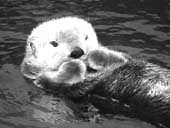July
06, 2001
U.S.
Fish and Wildlife Service
Office of Management Authority
4401 N. Fairfax Drive, Room 700
Arlington, VA 22203 USA
Facsimile: 1-703-358-2281
Re:
FR Doc. 01-15092, Notice of Receipt
of Applications for Permit
(PRT-020575 & RRT-043001)
To
whom it may concern:
It
has come to our attention that
two Japanese aquaria, Aquamarine
Fukushima and Oarai Aquarium,
are requesting for permit to
capture northern sea otters from
the US territory.
On
behalf of all members and supporters
of ALIVE, a Japanese non-profit
organization for protecting animals
and environment, I respectfully
urge you to reject the requests
for permit to capture and export
the wild northern sea otters,
which have been submitted by
the above-mentioned aquaria as
published by the U.S. Fish and
Wildlife Service in the Federal
Register on June 15, 2001.
According to ENN News ("Aleutian otters
take a nosedive" dated July 5,
2000), a survey conducted by the U.S. Fish and Wildlife Service last year
revealed that the sea otter population in Alaska's Aleutian Islands had
declined 70 percent since 1992 and 95 percent or more throughout much of
the archipelago since the 1980s. A survey conducted in the 1980s by the Alaska
Department of Fish and Game estimated that
there were 55,000 to 100,000
sea otters in the area. This
number had declined dramatically
to only 6,000 otters, according
to the last year's survey.
As Japanese citizens, we are all shocked and dismayed that those aquaria
are even considering, not to mention actually submitting the request for,
the capture of wild sea otters when their population is severely strained.
This is obviously not the time to put any unnecessary pressure to this already
critically endangered population and it seems to us the very act of submitting
this request at this time shows their ignorance of the current situations
concering sea otters or lack of concern about conservation of endangered
wildlife.
The last century saw some major changes in people's attitudes toward other
animals. More sea otters in aquaria would have been welcomed by a lot of
people in Japan a few decades ago. But increasing number of people are beginning
to realize what it really is to take wild animals, especially mammals, who
have strong ties with their families, away from their natural habitat and
they have stopped supporting the facilities which keep wild animals in captivity.
In fact, when one of the major Japanese newspapers reported the importation
of six sea otters and consequest death of 2 individuals in 1998, a lot of
people, especially school children, expressed their oppositions against taking
more animals from the wild when excellent modern methods are readily available
to let us learn about them without harming them.
Also, please do not be deceived by the untruthful claim made by those facilities
that they are educational institutions. Japanese aquaria do nothing to teach people what marine mammals really are;they train those animals
do cheap tricks to entertain people. And such people think it is entertaining
to watch the animals perform precisely because they have been given false
ideas about those wonderful creatures as aquaria have made those animals
behave unnaturally.
Once again, please do not let those facilities steal more wildlife from the
people of the United States.
Thank
you for giving us the opportunity
to make a comment.
Sincerely
yours,
Fusako
people
of the United States.
Thank
you for giving us the opportunity
to make a comment.
Sincerely
yours,
Fusako Nogami
Director
All
Life In a Viable Environment




![]()
 Oppose
sea otters hunt for aquaria
Oppose
sea otters hunt for aquaria